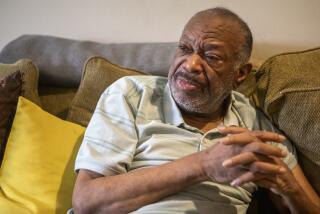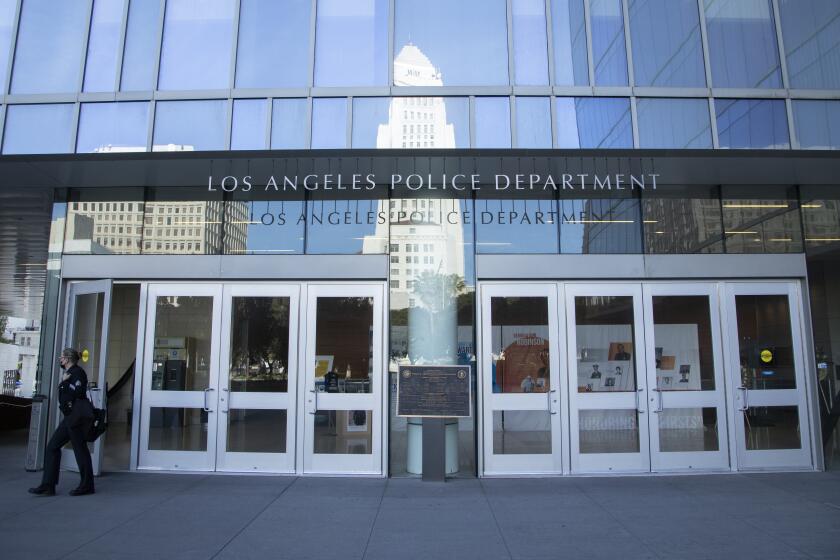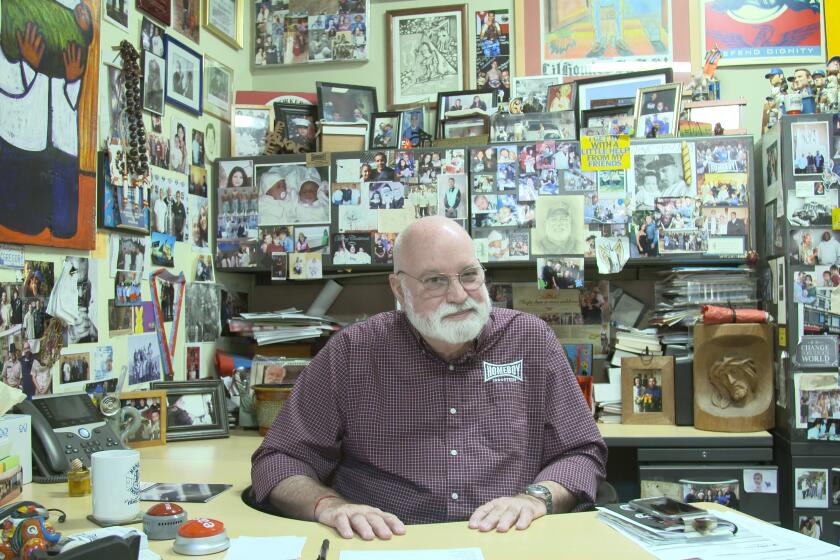Lomax Brings Savvy--and Liabilities--to Chief’s Cause : LAPD: Williams’ lawyer is known for her insider’s knowledge. But some say she is too confrontational.
With a controversial history and a combative style, prominent Los Angeles attorney Melanie E. Lomax is in many ways uniquely qualified to represent Police Chief Willie L. Williams against charges of impropriety and poor management by the Police Commission.
Lomax, a former police commissioner, is a savvy 45-year-old civil rights lawyer with an insider’s knowledge of how the system works. She is single-mindedly determined, has little patience for small talk and is far more concerned with winning than with building alliances.
Yet it’s because of this very nature that many of Williams’ most ardent supporters have winced since learning he hired Lomax.
Lomax, many local political observers say, is the last lawyer you would hire to quickly defuse a crisis involving the Police Department. She is aloof, unapologetically confrontational, quick to grab the spotlight and carries the added baggage of being accused of leaking documents while on the Police Commission.
As Lomax herself said in 1990 when she was named to the Police Commission: “Someone said they need a pistol over there. With me they’re getting a shotgun.”
To many, Lomax’s selection is a signal that the police chief has his fists clenched for what could be a prolonged, public fight or courtroom battle to restore a reputation tarnished by the commission’s accusations that he accepted free rooms or meals from a Las Vegas casino--and then lied about it.
In the bureaucratic arena, experts say, Lomax’s feistiness may aid Williams, but it could also hurt his standing among the LAPD’s rank-and-file officers, who believe that Williams does not adequately support cops on the street.
After all, it was Lomax who, while she was acting Police Commission chairwoman, pushed for the resignation of former Chief Daryl F. Gates, a man who was far more popular with most officers. In typical lone-wolf fashion, Lomax was unable to build a consensus. Gates outlasted her: She was forced off the commission, while Gates survived for another year before resigning.
City Councilman Mark Ridley-Thomas, a strong backer of Williams, defended the chief’s choice of Lomax.
“She knows the city, she’s a tenacious defender and she’s committed to the public safety agenda for the city,” Ridley-Thomas said.
But others--even those who are among Williams’ most avid supporters--questioned the wisdom of the decision.
“I don’t understand the chief’s choice,” said one of Williams’ supporters in the African American community. “It’s like pouring gasoline on fire. She’s going to [anger] both the union and the police hierarchy.”
*
Lomax, whose practice ranges from civil rights cases to representing the scandal-plagued Compton school district, has been in the public spotlight for more than a decade. In 1985 she created a furor within the National Assn. for the Advancement of Colored People when she accused five prominent black artists of discriminating against blacks by too often hiring white assistants.
Six years later, in the turmoil surrounding the videotaped beating of Rodney G. King, her efforts on the Police Commission to force Gates out attracted more controversy. She was criticized for giving legal memos to a civil rights group seeking Gates’ ouster--a move Gates’ defenders condemned as evidence she was anti-police.
“I’m not anti-police, I never was,” Lomax said in an interview Thursday. “That is a jacket put on me as it relates to my position with Gates. It was never the department. It was Gates and what I consider his hate-filled leadership.”
Eventually, Lomax and other commissioners were urged to resign by the Christopher Commission, which investigated the beating. Lomax was cleared by the State Bar of any wrongdoing in providing the documents.
A year later, the city was hit by riots. Gates later resigned, leaving an uneasy transition to Williams’ tenure as chief.
Gates said in an interview Thursday that Williams’ decision to use Lomax as his lawyer will further offend an LAPD work force that feels betrayed by Williams.
“For him to team up with her is a slap in the face of the average officer,” said Gates, who claimed his phone rang off the hook as officers learned the news. “It is bad judgment, bad advice.”
Responds Lomax: “Chief Williams recognized that I brought to the table a considerable knowledge, not only of the politics of Los Angeles, but the inner workings of the police departments. And I’m a labor lawyer. It was a good combination and, modestly speaking, a good choice.”
(On Friday, in an attempt to avoid a full-scale battle between Williams and the commission, City Councilman Marvin Braude, who chairs the council’s Public Safety Committee, said he has asked a former city attorney to intercede.
(Braude--one of Williams’ strongest allies on the council--said he has asked Burt Pines to meet with Mayor Richard Riordan and members of the council to draft a statement that would reflect their collective desire to end the controversy. Pines’ chance of succeeding is uncertain because council members have staked out a variety of positions and the mayor has generally avoided the Williams controversy.)
Lomax said she had never met Williams until the chief contacted her office in early February.
The two did not always see eye to eye. Early in Williams’ tenure, she was critical of the slowness of the department to discipline officers.
Lomax, a single mother of two adopted children, comes from a well-connected family with deep roots in Los Angeles. She graduated from Los Angeles High School, UC Berkeley and Loyola Law School.
Her father, the late Lucius Lomax, was a criminal attorney and real estate investor. Her mother, Almena Lomax, was a civil rights activist and journalist who published the Los Angeles Tribune. In the early 1960s, Almena Lomax took her children to the segregated South during the height of the civil rights movement. The experience had a lasting impact on Melanie, who decided to become a civil rights attorney instead of following her father into criminal law.
As longtime residents of the city, Lomax’s parents knew Mayor Tom Bradley when he was a foot patrolman. Lomax’s grandfather owned the historic Dunbar Hotel.
*
Before serving on the Police Commission, Lomax was a member of the city Airport Commission. She is a former vice president of the Los Angeles chapter of the NAACP and a former member of the Los Angeles Human Relations Commission.
The year after leaving the Police Commission she was in the spotlight again when the City Council refused to confirm her to a seat on the Water and Power Commission. The next year, she filed a lawsuit on behalf of a former aide to City Councilman Nate Holden who accused Holden of sexual harassment. Holden accused Lomax of trumping up the case because Holden had missed the council vote that denied Lomax the water commission seat.
Today, controversy swirls again around Lomax. Her mother is not surprised.
“She’s got a very sharp tongue,” Almena Lomax said. “There’s a time when you speak the truth and the truth hurts.”
More to Read
Start your day right
Sign up for Essential California for news, features and recommendations from the L.A. Times and beyond in your inbox six days a week.
You may occasionally receive promotional content from the Los Angeles Times.






